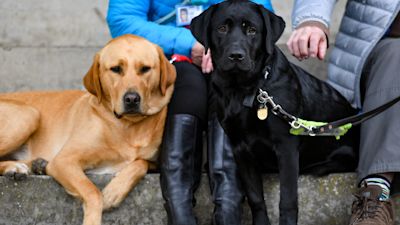Pet theft to become new criminal offence after lockdown dognapping spike

Pet abduction will be made a criminal offence under Government plans to crackdown on dognappers.
The law change will see the police improve the recording and tracking of pet abduction cases, with microchip databases also being made easier for officers to navigate.
There will also be a new requirement for owners to register additional details for their pets, to improve success rates in finding stolen animals and returning them home.
The changes comes after the government accepted a number of recommendations from the Pet Theft Taskforce, which was set up in May this year after an increase in reports of pets being stolen.
Under current law, if an animal is abducted the offence is treated as a loss of property to the owner, however the government says this "does not reflect the true severity of this crime".
The government says taken together, the changes will make it "far harder for thieves to steal and sell pets, will make it easier for the police to catch them, and will ensure that the impact on the animal is reflected in the sentences or penalties given to offenders".
Home Secretary Priti Patel said: "Stealing a pet is an awful crime which can cause families great emotional distress whilst callous criminals line their pockets.
"The new offence of pet abduction acknowledges that animals are far more than just property and will give police an additional tool to bring these sickening individuals to justice."
Around seven in 10 animal thefts involve dogs, according to the Metropolitan Police, and there are around 2,000 dog thefts reported each year in England and Wales.
There was a reported 3.5% increase in recorded cases of dog theft between 2019 and 20203, despite a 26% decrease in police recorded theft offences overall during the same period.
The Pet Theft Taskforce - made up of made up of officials from the Department for Environment, Food & Rural Affairs, the Home Office and the Ministry of Justice - suggested in its report the spike could have been indirectly sparked by last year's coronavirus lockdown.
Google searches for "buy a puppy" increased by over 160% in the months between March and August 2020 following the start of lockdown and according to Dog's Trust, the average cost of some breeds rocketed by as much as 90%.
The taskforce said a number of animal welfare charities believe "price increases may have triggered a rise in pet thefts".
It comes after ITV News reported on the theft of four eight-week-old cockapoo puppies, which were stolen in from a house in Gloucestershire at the end of August and spotted in Bristol days later.
Just a few hours after the puppies were taken there were reports of the dogs being sold out of a car boot in Little Stoke, north Bristol, for a £1,000 each.
After the sighting both Gloucestershire Police and Avon and Somerset Police issued fresh appeals to find the dogs.
Data collection on pet thefts will be improved when the law changes, so fluctuations can be noted and policies adjusted accordingly.
Pet microchip databases will also be made more accessible under the proposals.
There are currently 16 microchipping databases in England, however the taskforce found they can be difficult to navigate for pet owners and law enforcement, making it harder to trace stolen dogs.
Under the new proposals a single point of access to all databases will simplify the system.
The RSCPA said it was "really pleased" with the proposed law change.
RSPCA chief executive Chris Sherwood said: "The new Pet Abduction Offence will acknowledge the seriousness of this crime and we hope this will encourage courts to hand out much tougher sentences to pet thieves.
"We’re also thrilled that the government wants to simplify the microchipping database system and we believe this will help to tackle pet theft as well as other animal welfare issues and irresponsible pet ownership generally."